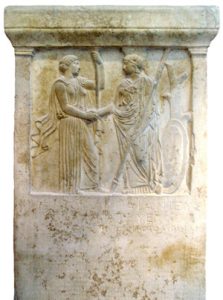
During the Hellenistic period, literary texts, but even more epigraphic sources, indicated an evolution and intensification of the diplomatic relations entertained by Greek cities. The number of treaties documented directly by inscriptions (which take on increasingly complex structures) increased, as did the number of honorary decrees, which testified to the merits of the city’s envoys. The different types of envoys that the city used to maintain its relations with the outside world multiplied: from ambassadors with purely political-diplomatic tasks (messengers, presbeutai in charge of concluding agreements, mediators, international arbitrators), to envoys with religious tasks (theoroi and sacred envoys in general), to bearers of purely juridical missions (city lawyers in arbitration cases and foreign judges, a figure that emerged and became established precisely in the Hellenistic period). At the same time, the language that can be ascribed to the diplomatic sphere was enriched. On the one hand, the city identified and developed a code of communication that tended to become rapidly shared, and on the other, the lexicon describing the envoy’s sphere of action was formed: the technical terminology relating to his functions and the set of words defining his qualities.
The project developed at the SAET proposes to address the theme of Greek diplomacy in the Hellenistic-Roman period – from the end of the 4th century to the 1st century B.C. – from a new perspective, starting from the specific focus on the envoy, in order to investigate the forms and instruments of international diplomacy, highlighting the continuities with the past but also the developments and innovations emerging in the period under examination.


